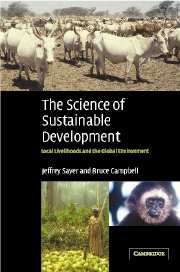Book contents
- Frontmatter
- Contents
- List of figures
- List of boxes
- List of tables
- Foreword
- Preface
- Acknowledgements
- Part I Integrating natural resource management
- 1 The challenge: alleviating poverty and conserving the environment
- 2 Dealing with complexity
- 3 Getting into the system: multiple realities, social learning and adaptive management
- 4 Issues of scale
- 5 Models, knowledge and negotiation
- Part II Realities on the ground
- Part III The research–management continuum
- Bibliography
- Index
2 - Dealing with complexity
Published online by Cambridge University Press: 18 May 2010
- Frontmatter
- Contents
- List of figures
- List of boxes
- List of tables
- Foreword
- Preface
- Acknowledgements
- Part I Integrating natural resource management
- 1 The challenge: alleviating poverty and conserving the environment
- 2 Dealing with complexity
- 3 Getting into the system: multiple realities, social learning and adaptive management
- 4 Issues of scale
- 5 Models, knowledge and negotiation
- Part II Realities on the ground
- Part III The research–management continuum
- Bibliography
- Index
Summary
Research on social-ecological systems, and particularly on agro-ecosystems, will inevitably be dealing with high levels of complexity. Such systems are characterised by multiple scales of interaction and response, and a high frequency of non-linearity, uncertainty and time lags (Box 2.1). Multiple stakeholders seek to satisfy overlapping and often competing objectives using resources that are both spatially and temporally variable. In spite of this, development planners, many of whom come from countries with market economies, have shown a surprising faith in approaches reminiscent of ‘central planning’. Development assistance often assumes levels of control and predictability that are rarely to be found in complex natural resource systems. Projects often have overly optimistic expectations of their potential to bring about predictable change in the decisions of the large numbers of households who depend upon rural landscapes to satisfy their livelihood requirements. The decisions made by these households are influenced by policies, incentive structures and access to external inputs. Decisions to adopt or not adopt new technologies or land-use practices by individuals and households depend on a multitude of factors, and the impact of external influences will vary from situation to situation.
Decisions of resource managers involve the weighing of many options. For instance, farmers weigh-up on-farm options and off-farm options that may involve temporary or permanent migration. They also contemplate whether to exploit, harvest and market resources, or whether to invest, maintain and conserve them.
- Type
- Chapter
- Information
- The Science of Sustainable DevelopmentLocal Livelihoods and the Global Environment, pp. 29 - 54Publisher: Cambridge University PressPrint publication year: 2003



